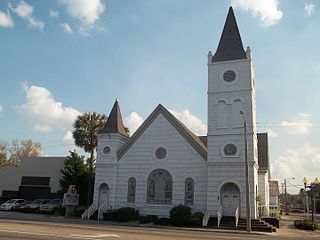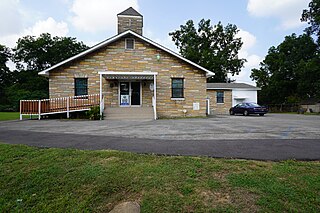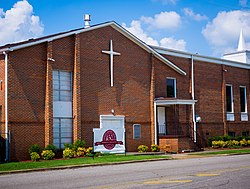
Edgar Daniel Nixon, known as E. D. Nixon, was an American civil rights leader and union organizer in Alabama who played a crucial role in organizing the landmark Montgomery bus boycott there in 1955. The boycott highlighted the issues of segregation in the South, was upheld for more than a year by black residents, and nearly brought the city-owned bus system to bankruptcy. It ended in December 1956, after the United States Supreme Court ruled in the related case, Browder v. Gayle (1956), that the local and state laws were unconstitutional, and ordered the state to end bus segregation.

The Judson Memorial Church is located on Washington Square South between Thompson Street and Sullivan Street, near Gould Plaza, opposite Washington Square Park, in the Greenwich Village neighborhood of the New York City borough of Manhattan. It is affiliated with the American Baptist Churches USA and with the United Church of Christ.

Frederick Lee Shuttlesworth was a U.S. civil rights activist who led the fight against segregation and other forms of racism as a minister in Birmingham, Alabama. He was a co-founder of the Southern Christian Leadership Conference, initiated and was instrumental in the 1963 Birmingham Campaign, and continued to work against racism and for alleviation of the problems of the homeless in Cincinnati, Ohio, where he took up a pastorate in 1961. He returned to Birmingham after his retirement in 2007. He worked with Martin Luther King Jr. during the civil rights movement, though the two men often disagreed on tactics and approaches.
Wyatt Tee Walker was an African-American pastor, national civil rights leader, theologian, and cultural historian. He was a chief of staff for Martin Luther King Jr., and in 1958 became an early board member of the Southern Christian Leadership Conference (SCLC). He helped found a Congress for Racial Equality (CORE) chapter in 1958. As executive director of the SCLC from 1960 to 1964, Walker helped to bring the group to national prominence. Walker sat at the feet of his mentor, BG Crawley, who was a Baptist Minister in Brooklyn, NY and New York State Judge.

Dexter Avenue Baptist Church is a Baptist church in Montgomery, Alabama, United States, affiliated with the Progressive National Baptist Convention. The church was designated as a National Historic Landmark in 1974 because of its importance in the civil rights movement and American history. In 1978 the official name was changed to the Dexter Avenue King Memorial Baptist Church, in memory of Dr. Martin Luther King Jr., who was pastor there and helped organize the Montgomery bus boycott in 1955 during the civil rights era. The church is located steps away from the Alabama State Capitol.

The black church is the faith and body of Christian congregations and denominations in the United States that minister predominantly to African Americans, as well as their collective traditions and members. The term "black church" can also refer to individual congregations.

The 16th Street Baptist Church is a Baptist church in Birmingham, Alabama, United States. In 1963, the church was bombed by Ku Klux Klan members. The bombing killed four young girls in the midst of the Civil Rights Movement. The church is still in operation and is a central landmark in the Birmingham Civil Rights District. It was designated as a National Historic Landmark in 2006. Since 2008, it has also been on the UNESCO list of tentative World Heritage Sites.
The Southeast Conference of the United Church of Christ is the regional body of the United Church of Christ within the states of Alabama, northwestern Florida, Georgia, Mississippi, South Carolina, and Tennessee. It maintains headquarters in Atlanta. The Rev. Char Burch serves as the executive.

The Bethel Church is a historically-black Baptist megachurch in Jacksonville, Florida, in the United States. Founded in 1838, it is the city's oldest Baptist congregation. The attendance is 12,000 members. The senior pastor is Bishop Rudolph W. McKissick Jr. The historic church building is on the National Register of Historic Places.
John H. Cross Jr. was an American pastor and Civil Rights activist. He was best known as the pastor of the 16th Street Baptist Church, an African American Baptist congregation in Birmingham, Alabama, at the time of church's racially motivated bombing in 1963. The bombing, which ripped through the church and killed four young girls, became a rallying cry for the Civil Rights Movement and propelled the problems of racial segregation in The South into the national spotlight. Cross spent much of the rest of his life working for racial reconciliation in the South.

Pullen Memorial Baptist Church is a Baptist church known for its progressive theology located in Raleigh, North Carolina, US, right beside North Carolina State University. Pullen, called "a fiercely independent Baptist church" whose traditions have "earned it a reputation far and wide as the South's premier liberal church," has a long history of civil rights activism, and is currently a leader on key issues of the day, from LGBTQ rights to activism in Moral Monday protests to alliances with like-minded people in distant places from Cuba to Nicaragua to Georgia in the Caucasus Mountains and Black Sea.

Stone Street Baptist Church is a historic African-American Baptist church in Mobile, Alabama. The congregation was established well before the American Civil War, with Stone Street Baptist recognized today as one of Alabama's most influential African-American Baptist churches. It was placed on the National Register of Historic Places on August 8, 1985.

First Baptist Church was the first Baptist church in Petersburg, Virginia; one of the first African-American Baptist congregations in the United States, and one of the oldest black churches in the nation. It established one of the first local schools for black children in the nation.

Gillfield Baptist Church is the second-oldest black Baptist congregation in Petersburg, Virginia and one of the oldest in the nation. It has the oldest handwritten record book of any black church. It was organized in 1797 as a separate, integrated congregation. In 1818 it built its first church at its current lot on Perry Street.

St. Louis Street Missionary Baptist Church is a historic African American church in Mobile, Alabama. It was added to the National Register of Historic Places on October 8, 1976, due to its architectural and historic significance.

Historic First Bryan Baptist Church is an African-American church that was organized in Savannah, Georgia, by Andrew Bryan in 1788. Considered to be the Mother Church of Black Baptist, the site was purchased in 1793 by Bryan, a former slave who had also purchased his freedom. The first structure was erected there in 1794. By 1800 the congregation was large enough to split: those at Bryan Street took the name of First African Baptist Church, and Second and Third African Baptist churches were also established. The current sanctuary of First Bryan Baptist Church was constructed in 1873.

Clayborn Temple, formerly Second Presbyterian Church, is a historic place in Memphis, Tennessee, United States. It was listed on the National Register of Historic Places in 1979 for local architectural significance. It was upgraded to national significance under Clayborn Temple in 2017 due to its role in the events of the Sanitation Workers' Strike of 1968. The historic structure was sold to the A.M.E. Church in 1949, which named the building after their bishop.

Second Baptist Church is a historically African-American Baptist church located in South Los Angeles, California. The current Lombardy Romanesque Revival building was built in 1926 and has been listed as a Los Angeles Historic-Cultural Monument (1978) and on the National Register of Historic Places (2009). The church has been an important force in the Civil Rights Movement, hosting national conventions of the National Association for the Advancement of Colored Persons ("NAACP") in 1928, 1942, and 1949, and also serving as the site of important speeches by Martin Luther King Jr., Malcolm X, and others. It is affiliated with the American Baptist Churches USA and the Progressive National Baptist Convention.

Shady Grove Baptist Church is a historic church at 3444 31st Way North, Collegeville in Birmingham, Alabama. The building is of concrete construction that was built in 1942 under the direct of its pastor, the Rev. Lewis J. Rogers. The exterior was faced with Permastone in the early 1960s. It is significant for its congregation's participation in the Alabama Christian Movement for Human Rights rallies for Civil rights in the 1950s and the 1960s under Rogers' direction. The building was added to the National Register of Historic Places in 2005.

Joseph W. Ellwanger Jr. is a Lutheran pastor, author, and civil rights activist. He was a key figure in the Civil Rights Movement in Birmingham, Alabama, and the only white religious leader included in strategy meetings with Martin Luther King Jr.





















